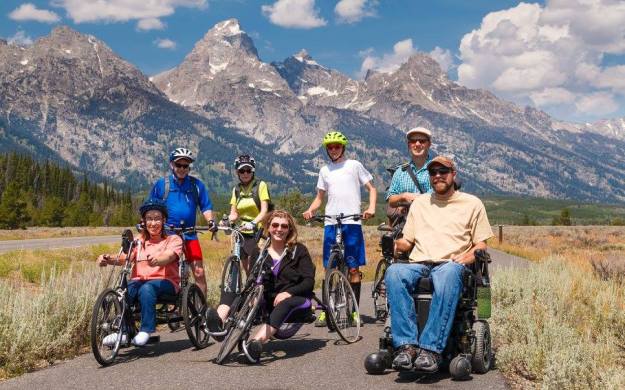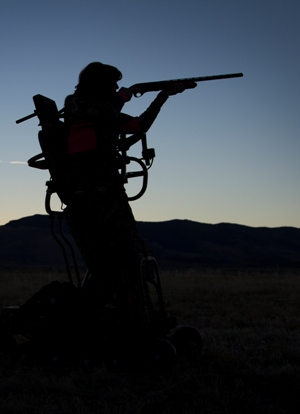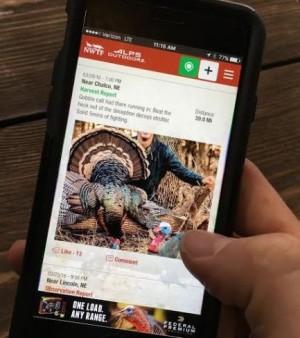
I think one of the things missing in the outdoors is letting people with disabilities know that they're represented in the outdoor community, that the outdoor community very much wants them to be a part of the outdoor fraternity, and that there are many programs and hunting and fishing opportunities for them that they may not realize. We at Mossy Oak want people with disabilities to know that more than likely if they really want to hunt and fish, there is a way that they can, and that outdoor manufacturers are creating more products that are accessible for people who want to participate in hunting and fishing. I also want people with disabilities to be recognized as a demographic and as consumers of outdoor products. I know of little information being put out about new outdoor equipment that can be or that is adaptable for people with disabilities. Plenty of outdoor equipment that isn’t manufactured specially for people with disabilities can be used by people with disabilities.
We also want to let them know about the opportunities available for getting funding for adaptive outdoor equipment, the success stories of people who have raised money and ideas on how to raise money to get adaptive equipment. Mossy Oak doesn’t want there to be any obstacles that people can’t overcome to participate in all the outdoor sports.
Another question I'm often asked is, “What does your family think about you becoming a professional outdoor woman?” My family is so excited about me working with Mossy Oak and other outdoor companies and working in the outdoor industry. Living the outdoor lifestyle has been a dream of ours for many years. My husband, Russ, has been a huge influence in encouraging me to get into the outdoors. Our 5-year-old daughter, Addison, hasn’t ever known anything but the outdoor lifestyle all her life. We’ve been looking for a way for our entire family to become involved in the outdoors, and this is our plan. It’s an exciting journey that we’re on, and we want to show the other 50-million people with disabilities that as our dreams become a reality in the outdoors, theirs can too.
I know many people may be somewhat hesitant to ask a person with a disability to go hunting and fishing with them. However, just consider a person in a wheelchair or with some other type of disability as another person. Talk to him or her like you will anyone else who doesn’t have a disability.
Something I've learned is that people are concerned about asking people with disabilities any questions. However, don’t be afraid to ask questions. A lot of times people with disabilities will tell you, “This is what I need, and this is what I don’t need.” For instance, ask me if I want to go hunting and fishing with you. Ask me how I plan to get to the hunting or fishing site. Ask me how I'm going to get from my vehicle to my stand site. You can ask me how I’ll do anything that you're unsure of how I can accomplish that task.
 When I go hunting, fishing, 4-wheeling or hiking, I've noticed I'm probably the only lady in a group of men. Once again, I realize that outdoor women with disabilities are somewhat of a rare breed. I think that sometimes women with disabilities or even men with disabilities just need encouragement to be able to enjoy all the outdoor sports available. So, I hope to encourage other men and women to see that I'm out there hunting, fishing and enjoying the great outdoors, and they can be out there too. Either come with me, or I’ll show you how to become an outdoor woman/man with a disability.
When I go hunting, fishing, 4-wheeling or hiking, I've noticed I'm probably the only lady in a group of men. Once again, I realize that outdoor women with disabilities are somewhat of a rare breed. I think that sometimes women with disabilities or even men with disabilities just need encouragement to be able to enjoy all the outdoor sports available. So, I hope to encourage other men and women to see that I'm out there hunting, fishing and enjoying the great outdoors, and they can be out there too. Either come with me, or I’ll show you how to become an outdoor woman/man with a disability.
I like to see more men and especially more women out there enjoying the great outdoors like I do. I’m sure plenty of people with disabilities would love to be a part of all that’s outdoors. I’ve found that I can do almost anything required to hunt, fish, hike, ride a 4-wheeler or do anything else outdoors – and you can too. I just may do it differently from people who don’t have a disability.
For me, I've found the outdoors to be a very healing place. After my accident, one of my biggest fears was the outdoors would be inaccessible to me, and I’d no longer be able to enjoy the outdoors. But once I discovered that being in the outdoors was a possibility, I also discovered that being in the outdoors was where I healed mentally, emotionally and physically. The outdoors gives me an opportunity to challenge and push myself to become more than I’ve ever thought I could. I’ve found a real joy in the outdoors that I never thought I’d find after my accident.
Being outdoors was something I loved to do before my accident, and I thought I was going to have to give it up. So, anytime I'm outdoors, I'm reminded of how blessed I am, and how much God’s plan for me is so much bigger and better than I ever can have imagined. The outdoors has become my new sporting arena. I don’t play volleyball, basketball or softball anymore, but I can play in the outdoors. It’s my new arena where I can challenge myself, be competitive and push my limits.
To learn more about Ashlee Lundvall go to her website www.ashleelundvall.com or https://www.facebook.com/ashlee.lundvall/.
Day 4: Ashlee Lundvall: My Passion for the Outdoors Doesn’t End When the Hunt Does



























